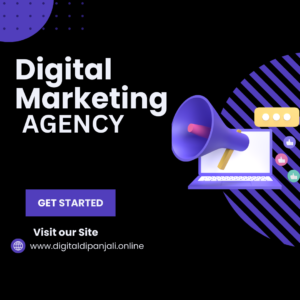
Digital Marketing Agency, we transform your digital presence with tailored strategies designed to meet your business goals. Our expert team combines creativity and analytics to deliver impactful solutions across all platforms. From crafting engaging content and optimizing your website for search engines to managing social media campaigns that resonate with your audience, we ensure your brand stands out in a crowded marketplace. Let us help you build meaningful connections with your customers and drive sustainable growth.
Digital Marketing Agency is your go-to partner for navigating the complexities of the digital world. We specialize in creating comprehensive marketing strategies that encompass everything from SEO and email marketing to influencer partnerships and conversion optimization. Our data-driven approach allows us to track and measure success in real time, ensuring that your campaigns are always optimized for maximum impact. With Digital you can confidently embark on your digital journey, knowing you have a team dedicated to your success.
OUR SERVICES
Digital marketing encompasses a wide range of online marketing strategies and tactics used to connect with potential customers through digital channels. As the internet continues to evolve, digital marketing remains a crucial component for businesses seeking to reach and engage their audience effectively.
Key Components of Digital Marketing
- Search Engine Optimization (SEO):
- Definition: The practice of optimizing website content to rank higher in search engine results pages (SERPs).
- Techniques: Includes keyword research, on-page optimization (like meta tags and content structure), technical SEO (site speed, mobile-friendliness), and off-page SEO (backlink building).
- Content Marketing:
- Definition: Creating and distributing valuable content to attract and engage a target audience.
- Formats: Blogs, videos, infographics, e-books, and podcasts that inform or entertain.
- Social Media Marketing:
- Definition: Using social media platforms to promote products and services, engage with customers, and build brand loyalty.
- Platforms: Facebook, Instagram, Twitter, LinkedIn, TikTok, and Pinterest, each catering to different audiences and content types.
- Email Marketing:
- Definition: Sending targeted emails to a list of subscribers to promote products, share updates, or nurture leads.
- Strategies: Include newsletters, promotional campaigns, automated sequences, and re-engagement tactics.
- Pay-Per-Click (PPC) Advertising:
- Definition: A model of internet marketing where advertisers pay a fee each time their ad is clicked.
- Platforms: Google Ads, Bing Ads, and social media advertising, allowing for precise targeting based on demographics and user behavior.
- Influencer Marketing:
- Definition: Collaborating with influencers—individuals with a significant online following—to promote products or services.
- Benefits: Leverages the influencer's credibility and reach to enhance brand visibility and trust.
- Analytics and Data Analysis:
- Definition: Using data analytics tools to track and measure the performance of digital marketing efforts.
- Tools: Google Analytics, social media insights, and email marketing analytics provide valuable data on user behavior, conversion rates, and engagement metrics.
Benefits of Digital Marketing
- Global Reach: Unlike traditional marketing, digital marketing allows businesses to reach a global audience at a relatively low cost.
- Cost-Effectiveness: Many digital marketing strategies, such as SEO and content marketing, can be more affordable compared to traditional methods.
- Measurable Results: Digital marketing offers real-time data and analytics, allowing marketers to track performance and optimize strategies effectively.
- Targeted Audience: With tools for precise targeting, businesses can reach specific demographics, interests, and behaviors, ensuring that marketing efforts resonate with the right audience.
- Improved Engagement: Digital channels facilitate two-way communication, allowing brands to interact with customers directly and foster relationships.
Best Practices for Digital Marketing
- Create a Comprehensive Strategy: Integrate various digital marketing channels and tactics into a cohesive strategy that aligns with business goals.
- Focus on Quality Content: Prioritize high-quality, relevant content that provides real value to the audience, fostering trust and engagement.
- Utilize SEO Best Practices: Optimize content for search engines to enhance visibility and drive organic traffic.
- Leverage Data Analytics: Continuously analyze performance metrics to refine strategies, improve targeting, and enhance overall effectiveness.
- Engage with the Audience: Foster two-way communication through social media, email, and interactive content to build relationships and loyalty.
Emerging Trends in Digital Marketing
- Artificial Intelligence (AI): AI tools are being used for data analysis, personalized marketing, chatbots, and predictive analytics, enhancing efficiency and user experience.
- Voice Search Optimization: With the rise of smart speakers and voice-activated devices, optimizing content for voice search is becoming increasingly important.
- Video Marketing: Video content continues to grow in popularity, with live streaming, short-form videos, and interactive video content gaining traction.
- Personalization: Customized experiences based on user behavior and preferences are becoming essential for enhancing engagement and conversion rates.
- Sustainability and Ethical Marketing: Brands are increasingly focusing on sustainability and social responsibility, appealing to conscious consumers.
Conclusion
Digital marketing is a multifaceted approach that allows businesses to connect with their audience in meaningful ways. By leveraging various strategies and staying updated on trends, companies can effectively enhance their brand presence, engage customers, and drive growth in a competitive digital landscape. As technology evolves, embracing innovation and adapting to changes will be crucial for success in digital marketing.





